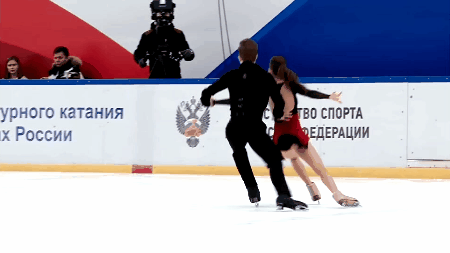#russian junior nationals 2019
Explore tagged Tumblr posts
Photo


Elizaveta Khudaiberdieva and Andrey Filatov skating to the La La Land soundtrack for their rhythm dance at the 2019 Junior Grand Prix Final and 2020 Junior Russian Championships.
(Sources: Sport24 and veravalenta)
#Elizaveta Khudaiberdieva#Andrey Filatov#Khudaiberdieva Filatov#La La Land#Figure skating#Ice dance#Musicals Operetta Broadway#Tea Time Foxtrot#2019–2020#2019 Junior Grand Prix Final#2020 Junior Russian Nationals#Russia
8 notes
·
View notes
Text
youtube
Anastasia Simakova (GER/TSV Schmiden), Clubs, 2023 DTL RSG Bundesliga Finale
Simakova was the 2019 Junior World Champion in Rope. She changed nationalities from Russia to Germany but Russia opposed her change and she's currently sitting out of international competition for one year until March 2024. However she is able to continue competing domestically in the Rhythmic Bundesliga. Irina Viner has not opposed all Russian gymnast country changes and I do not know the story behind why she has opposed Simakova's.
13 notes
·
View notes
Text
Eurovision 2004 - Number 58 - Nadezhda Tamelo - "Dozhdis"
youtube
The other debutant at this year's Eurovision is Belarus and they've organised a new national final hosted at the main TV studios of BTRC in Minsk. For some reason most of the songs that are available to view have only survived in black and white copies. One of the 15 monochrome competitors is Nadezhda Tamelo with Дождыс (Dozhdis/Rain).
It's a song sung both in Belarusian and in English. This makes her an exception as nearly every other song is entirely in Belarusian or Russian. It's a suitably angry and sultry pop balladry. Nadezhda and her partner are apart for reasons that unclear. Nadezhda is clearly committed to them, while their affections seem uncertain. Nadezhda is begging them not to leave by gnashing her teeth and showing off her seductive side. I think she knows that there isn't much hope and frankly she's already angry at the anticipated betrayal.
The guitar underneath all of this is having fun picking out minor vamps and generally playing low key - giving the required air of doom that Nadezhda hasn't really accepted yet. You can hear the rain of the title beating on the metaphorical window. I think I can even hear puddles forming in the instrumentation. I don't know how they're doing that.
It wasn't enough however and she finished in 12th place out the 15 entrants. She wasn't even affected by the allegedly dodgy phone lines in Gomel that resulted in a contested outcome for the win.
Nadezhda did return to the Belarusian national final on another couple of occasions, but only after changing her name to Natalia Tamelo. She even got into the superfinal in 2005. Her last appearance was in 2014. Most of the time, the songs were written by Leonid Shirin. In fact some other songs that Leonid wrote for other Belarusian (and Polish) national finalists were co-written by a Natalia Tambovtseva. I think this may be Nadezhda/Natalia's actual name. If so, then she co-wrote Belarus's 2019 Junior Eurovision entry.
#esc#esc 2004#eurovision#eurovision song contest#istanbul#istanbul 2004#Youtube#national finals#Belarusian Selection 2004#Belarus#Nadezhda Tamelo#Natalia Tamelo#Leonid Shirin
2 notes
·
View notes
Text
Shortly after his populist far-right Freedom Party made gains in Sunday’s state elections in Salzburg, Herbert Kickl, the party’s leader, struck a triumphant tone. “We’ve succeeded in further strengthening our solidarity with the people,” Kickl said. “The next step, by fall at the latest, is a run for the chancellery and a government under [Freedom Party] leadership.”
That would have been crazy talk a few years ago. But in Austria, time’s arrow always seems to point in one direction.
The Freedom Party of Austria (FPO) has had a tough few years. In the spring of 2019, the FPO was the junior partner in a coalition with the conservative People’s Party (OVP). But that May, German media published a secretly recorded video of then-FPO leader Heinz-Christian Strache on the Spanish island of Ibiza, in which he made shady deals with a woman he believed was the niece of a Russian oligarch. The video and the resulting fallout, known as the “Ibiza affair,” toppled the right-wing government and led to snap elections, in which the FPO lost nearly 10 points and dropped to just 16 percent support among the electorate.
Nearly four years later, it’s as if Ibiza never happened. In Sunday’s vote in Salzburg, the FPO won nearly 26 percent of the vote, gaining nearly 7 percentage points compared with 2018. The People’s Party, meanwhile, the party of current Chancellor Karl Nehammer, went backwards. The Salzburg vote was the latest proof that the FPO has, like an intrepid DJ, shaken off the stank of Ibiza and somehow, once again, come out on top.
It’s not just Salzburg. Back in late January, the FPO won 24 percent of the vote in the region of Lower Austria, a big jump over 2018. And nationally, the FPO is averaging 28 percent in the polls, comfortably ahead of the center-left Social Democrats, which have 23 percent support, and the OVP, with 21 percent. In other words, after years of rebuilding, Austria’s far right has not only regained its previous support but become the country’s dominant political force.
Like its counterparts in countries across Europe, the FPO has weaponized rising inflation and energy prices to increase its support since last fall. It has also capitalized on a range of other domestic political developments, including the unpopularity of the current OVP-Greens government, the relative weakness of the Social Democrats, and a series of scandals within the governing OVP that have made the Ibiza scandal look almost appealing by comparison.
Experts say the far-right party’s efforts to differentiate itself from other parties on the various crises of the past few years—whether the government response to the coronavirus, the economic aftermath of the war in Ukraine, or Austria’s tepid response to Russian aggression—have added wind to its sails and helped the party win back some of its previous voters.
“This is what the Freedom Party has always managed very well: to occupy the position that’s ‘free,” said Peter Hajek, a Vienna-based pollster. “If everyone else is basically in favor of the sanctions against Russia, the [FPO] will go to the opposite side. And that is, of course, the advantage of being a populist, even opportunist, party.”
The FPO has also benefited from the fact that voters have short memories—and, because of scandals and troubles in other major parties, Ibiza feels like a distant memory. After investigators found that former OVP Chancellor Sebastian Kurz and his allies had spent government funds on doctored opinion polling to bolster their political position, Kurz resigned from office in fall 2021. Since then, a steady stream of revelations from the scandal surrounding Kurz and his inner circle have continued to come to light, giving voters the impression that the FPO is the less corrupt party after all.
“A lot has happened in between, and much of it has to do with the weakness of [the FPO’s] opponents,” Hajek said. “After the problems with Sebastian Kurz and his allies, many people of course said, ‘Okay, what the Freedom Party did isn’t actually that bad, the other guys are worse.’”
This, combined with a leadership battle within the Social Democrats that has weakened the party’s image as a viable alternative, has driven a solid section of the voters who supported the OVP after Ibiza back to the FPO. “I think people have really lost trust [in the governing OVP], and a protest vote against ‘those up there’ is always a way out,” said Ruth Wodak, an expert in populist far-right rhetoric who works at the University of Vienna. “And the left-wing opposition is currently not proposing an alternative program.”
The FPO was founded in the 1950s and, in its early years, was led by former Nazis. It was among the first of the modern populist far-right parties to gain prominence in Europe: In the 1980s, under the leadership of the late FPO politician Jorg Haider, the party developed the kind of nativist, hard-line immigration rhetoric it’s known for today. Kickl, the current party leader, served as Haider’s speechwriter.
In 1999, the party won nearly 27 percent in parliamentary elections and became the junior partner in the government at the time, a move that drew major international censure. (That coalition fell apart in 2005 due to infighting and scandal.) In the years since then, the cordon sanitaire—an explicit agreement among the other mainstream political parties against collaborating with the FPO—has all but disappeared in Austria. When the FPO entered government again in late 2017, the move gained comparatively little international attention.
That lack of a solid cordon sanitaire is on display in Lower Austria, where the state-level OVP recently formed a governing coalition with the FPO. That came despite the fact that the local FPO leader, Udo Landbauer, had previously resigned from office over a scandal involving a Nazi-era songbook, used by his far-right fraternity, that made light of the Holocaust. (He stepped down in 2018 and was back in party leadership later that year.) Since taking office, the Lower Austrian government has pursued a series of policies that serve as red meat to far-right voters, including trying to refund fines to those who violated coronavirus-related restrictions during the pandemic and creating a restaurant subsidy for locales that serve “traditional and regional” food (in other words, schnitzel and strudel).
Whether the FPO can translate these recent state-level victories into similar gains at the national ballot box remains to be seen. The country’s next parliamentary elections are slated for autumn 2024, although there’s a chance they’ll be called earlier. Even if the FPO were to end up back in the national-level government, as Kickl predicts, it may not stay there for long.
“The problem always begins when they get into government: When you govern, you sometimes have to push through policies that are unpopular, and the populists don’t want that,” Hajek said. “It’s always been the case that as soon as the FPO is in government, they have a problem.”
3 notes
·
View notes
Text

Zhan Beleniuk (January 24, 1991) was born in the capital city of Kyiv to Svitlana Beleniuk, a Ukrainian dressmaker, and Vincent Ndagijimana, an ethnic Hutu and former student at Ukraine’s National Aviation University, who was killed in his native Rwanda. The only child of his mother, he was raised with his grandmother in a one-room apartment in Kyiv. He began working at an early age to earn income for the family.
He took up the sport of Greco-Roman style wrestling. He earned medals in international junior competitions and 2014 won gold at the European Wrestling Championships and bronze at the World Championships. He captured gold in his weight class at the World Wrestling Championships and gold at the European Wrestling Championships. He won a silver medal at the Olympic Games held in Rio de Janeiro. In 2018 he placed first in the European Championships; first place in 2019 at the European Games in Minsk, Belarus, and the World Championships in Nur-Sultan, Kazakhstan. The crowning achievement of his athletic career was to win gold at the 2020 Olympic Games in Tokyo. It was the only gold medal won by Ukraine at that world competition and the only gold in 25 years.
He ran for a seat in the Ukrainian Parliament becoming the first person of sub-Saharan African descent to occupy such high political office in that nation. A recognized Olympic gold medalist and member of Parliament was verbally assaulted by youths who called him “a Black monkey” and told him to “go back to Africa.”
The start of the Russian invasion of Ukraine on February 24, 2022, brought attention to him who was interviewed by American media outlets because of racially-inspired mistreatment of foreign students of color struggling to flee across borders to safety. He was asked to comment on how he hoped to defend his country against Russian aggression. Though lacking military training he armed himself and told one reporter: “We’ve heard that the Russians have targeted the president and certain members of Parliament, because they want to bring in a puppet who will follow their orders. But I am from Kyiv. I am not going anywhere, and nor is the president.” #africanhistory365 #africanexcellence
3 notes
·
View notes
Text

The NY Times By Elizabeth Williamson Nov. 30, 2024
Kash Patel, President-elect Donald J. Trump’s choice as director of the F.B.I., does not have the typical background for that position. A former federal prosecutor and public defender, he has little management or law enforcement experience. The president-elect cites as a key credential Mr. Patel’s unflagging efforts to discredit the Justice Department’s investigation into Russian efforts to influence the 2016 presidential election in favor of Mr. Trump.
Here are five takeaways from a recent New York Times profile of Mr. Patel, who has denounced his critics as biased against Mr. Trump and has said he led efforts to expose F.B.I. “corruption.”
Former colleagues question his qualifications.
Mr. Trump said in his social media post announcing his choice for the F.B.I. that Mr. Patel had “tried over 60 jury trials.” Colleagues from Mr. Patel’s time as an entry-level public defender in Florida recall him as a middling performer with a deep animosity toward the Justice Department prosecutors he found himself up against. His former supervisor, Michael Caruso, a federal public defender who led the Southern District of Florida office at the time, said that Mr. Patel shied away from filing motions that he was likely to lose.
Mr. Patel spent about three years as a terrorism prosecutor at the Justice Department. He has repeatedly claimed he was the “lead prosecutor” in the government’s pursuit of the perpetrators of the 2012 attack on a U.S. diplomatic compound in Benghazi, Libya, that killed four Americans. In fact, Mr. Patel was a junior Justice Department staff member at the time, and he was not part of the trial team.
He is the author of the ‘Nunes Memo.’
Mr. Trump ordered that Mr. Patel be given a job on the National Security Council staff after Mr. Patel, then a House Intelligence Committee staffer, impressed Mr. Trump as the primary author of what has come to be called the secret “Nunes memo.” The document was a key element in the effort of House Republicans to undermine the Justice Department’s investigation of Russian meddling in the 2016 election.
Mr. Patel’s memo, which Mr. Trump declassified over the objections of the intelligence agencies and Democrats, fueled bogus claims by Mr. Trump, Republicans and conservative media that politics drove the Russia investigation and that the government had spied on the Trump campaign itself.
He was a would-be ‘political executioner.’
In 2019, as President Trump battled public outrage and a looming impeachment over his effort to enlist Ukraine in digging up dirt on former Vice President Joseph R. Biden Jr., he proposed to a group of top advisers that Mr. Patel, a backbench staffer on the National Security Council, begin vetting White House aides for loyalty. He would have served as a “political executioner,” in the words of Charles Kupperman, the deputy national security adviser at the time. Mr. Kupperman and White House legal advisers talked the president out of it, saying it would create legal and morale problems.
He says his nonprofit helps Jan. 6 defendants.
The Kash Foundation is a nonprofit that Mr. Patel has said offers financial help to a range of recipients, including the families of people charged for their roles in the Jan. 6, 2021, attack on the Capitol. Tax filings for 2023 show the foundation’s revenue surged from $182,000 in 2022 to $1.3 million last year. Its expenses rose fivefold over 2022 to $674,000. Almost half of that was spent on promotion and advertising, an expense that totaled more than the foundation gave away in contributions and grants last year.
He sells pro-Trump merchandise under the logo K$H.
Since the end of the Trump administration, Mr. Patel has parlayed his association with the former president into enterprises he promotes under the logo “K$H.” He sells pro-Trump T-shirts and other items as well as a series of his children’s books that pay homage to “King Donald.” Mr. Patel also collected hundreds of thousands of dollars in consulting fees from the 2024 Trump campaign and from Friends of Matt Gaetz, the campaign committee for the former House Republican from Florida, who withdrew from consideration as Mr. Trump’s attorney general after criticism over allegations of sex trafficking and drug use.
https://www.nytimes.com/2024/11/30/us/politics/kash-patel.html
0 notes
Text
Tuesday, August 29, 2023
Some wildfire evacuations end in British Columbia, but fire threatens community farther north (AP) The wildfire situation showed some improvement in British Columbia on Sunday, with more people being allowed to return home, but blazes continued to threaten communities farther north in Canada’s Northwest Territories. Hot temperatures and winds expected to gust to up to 40 kph (25 mph) were fanning flames around the Northwest Territories town of Hay River, on the south shore of Great Slave Lake. About 240 wildfires were burning in Canada’s northern territory. So far, 296,678 hectares (733,107 acres) had been affected.
Biden (and Trump) seen as too old for office (AP) Americans actually agree on something in this time of raw discord: Joe Biden (80) is too old to be an effective president in a second term. Only a few years his junior, Donald Trump raises strikingly less concern about his age. But they have plenty of other problems with Trump. If anything, some say, the 77-year-old ought to grow up. Age discrimination may be banned in the workplace but the president’s employers—the people—aren’t shy about their bias. In the poll, fully 77% said Biden is too old to be effective for four more years. Not only do 89% of Republicans say that, so do 69% of Democrats. That view is held across age groups, not just by young people. In contrast, about half of U.S. adults say Trump is too old for the office.
Tropical Storm Idalia Strengthening as It Moves Toward Florida Gulf Coast (WSJ) Tropical Storm Idalia is set to intensify into a hurricane on Monday on its way toward Florida, which is bracing for its first major storm of the Atlantic hurricane season. The storm is expected to make landfall Wednesday as a dangerous major hurricane and lash the Gulf Coast, according to the National Hurricane Center. Florida Gov. Ron DeSantis said Idalia would come ashore in Florida’s Big Bend region, where the Panhandle meets the state’s peninsula. Idalia, which strengthened into a tropical storm Sunday, could become at least a major Category 3 hurricane before it reaches Florida. The storm Monday afternoon was swirling northward in the Gulf of Mexico toward western Cuba, about 315 miles southwest of Key West, forecasters said. DeSantis declared a state of emergency for more than 45 counties. Much of the Gulf Coast, including Tampa Bay, was under a hurricane warning Monday. Thousands of people in low-lying areas were ordered to evacuate.
Thousands gather at annual Redhead Days Festival in the Netherlands (Washington Post) At this festival, red is more than a hair color—it’s an identity worth celebrating. Thousands gathered in the city of Tilburg in the Netherlands this week to celebrate redheads and “gingers” at an annual summit, complete with campfires, photo booths, portrait painting, dancing and even an info session on skin cancer. “Anything that makes you special, whether that is red hair or a quality, like introversion, is something you should not hide, but rather celebrate proudly and exuberantly and make it your unique selling point,” the festival website reads, adding that people from more than 80 countries have attended throughout the years. About 1 to 2 percent of people with European ancestry have red hair, according to a 2019 academic paper, though the number can be higher in areas such as Wales, Scotland and Ireland. The Redhead Days Festival started informally in 2005, when its director, a painter named Bart Rouwenhorst, put out a newspaper ad for 15 red-haired models and received registration information from 150. Because Rouwenhorst “had trouble saying no,” he asked all the models to gather for a group photo, according to the festival’s website. The event then inspired him to start formally organizing the event.
A Former French President Gives a Voice to Russian Sympathies (NYT) Nicolas Sarkozy, the former French president, was once known as “Sarko the American” for his love of free markets, freewheeling debate and Elvis. Of late, however, he has appeared more like “Sarko the Russian.” In interviews coinciding with the publication of a memoir, Mr. Sarkozy, who was president from 2007 to 2012, said that reversing Russia’s annexation of Crimea was “illusory,” ruled out Ukraine joining the European Union or NATO because it must remain “neutral,” and insisted that Russia and France “need each other.” His statements provoked outrage from the Ukrainian ambassador to France and condemnation from several French politicians. The remarks also underscored the strength of the lingering pockets of pro-Russian sympathy that persist in Europe. In France, Germany, Italy and elsewhere, not even the evident atrocities of the Russian onslaught against Ukraine have stripped away the affinity for Russia traditionally found on the far right and far left.
Italian banker hailed a hero after catching toddler falling from fifth floor balcony (CNN) A 37-year-old banker from Turin is being hailed a hero after miraculously catching an Italian toddler who fell from her family’s fifth floor balcony on Saturday. Mattia Aguzzi said he and his girlfriend were walking to a bread shop in central Turin, Italy just before 11 a.m. local time, when he heard a man yelling for help from an upper floor apartment. “I heard a man scream when he saw a little girl leaning out on the ledge. When I saw her fall I stepped in the way, closed my eyes and hoped that everything was going to be for the best, I blocked her by cushioning the blow and we both fell to the ground,” he said. First responders took the girl to hospital. He said the girl’s parents were in shock but the girl is “fine.” The banker said he isn’t a hero. “I tried to do what had to be done.”
Wagner chief Prigozhin’s lingering popularity a challenge for Putin (Washington Post) Russians mourning the death of Wagner chief Yevgeniy Prigozhin have set up makeshift memorials in nearly two dozen cities across Russia and occupied Ukraine in recent days, a sign of the commander’s lingering popularity and a potential challenge for President Vladimir Putin amid divisions within the elite and in the military over the conduct of the war. The memorials—while not a national outpouring of shock and grief—nonetheless showed Prigozhin’s support across Russia in hard line pro-war circles, and highlighted the Kremlin’s delicate task of managing potential anger among his supporters, with many in Russia’s elite convinced that Prigozhin’s death was an assassination ordered by the Kremlin. During the war, Prigozhin grew his popularity with salty, brutally direct videos recorded near the front lines as explosions blasted nearby, visiting his men in underground warzone bunkers. As Russia’s war effort faltered, he emerged for many as a trusted truth-teller, one of the few prominent figures willing to defy Russia’s laws against discrediting the military, by exposing military failures and steep casualties.
In a Place Shattered by War and Earthquakes, People Feel Forgotten (NYT) On the spot where a three-story building completely collapsed after a devastating earthquake struck northwestern Syria in February, a small tent encampment has sprung up. Residents call it “the camp of the forgotten.” In one of the tents—which feels like a sauna during the daytime—sleep Fatima al-Miree, 61, and her family of seven. It’s pitched outside their single-story home, which still stands next to the encampment, but with cracks running threateningly up and down the walls. She said she had lost count of how many aid groups had come, photographed the damage and left. More than six months after a powerful earthquake hit northwestern Syria and southern Turkey, many of those affected in Syria feel forgotten: There have been limited repairs and almost no rebuilding. And while the death and destruction in neighboring Turkey was far greater, the recovery effort in Syria is far more complicated. Millions of those living in the quake zone had already fled fighting, and many were sheltering in tents or other makeshift housing, reliant on international aid, when disaster struck again. The situation has worsened recently. Last month, a U.N. resolution to allow cross-border aid from Turkey expired, putting much of the humanitarian support for the area in limbo.
Pope to fly across world to visit Mongolia’s tiny Catholic flock (Reuters) Mongolia’s Catholics—all 1,450 of them—could be squeezed standing into St. Peter’s Basilica dozens of times over and their number is smaller than the congregation of a small parish in some small towns. So why is Pope Francis, 86 and in need of a wheelchair, travelling 8,278 km (5,143 miles) to visit them this week? Essentially, to paraphrase British climber George Mallory’s response in the 1920s as to why he wanted to climb Mt. Everest, because the Catholics are there. Visiting places where Catholics are a minority is part of Francis’ policy of drawing attention to people and problems in what he has called the peripheries of society and of the world. Francis, who will be attending an inter-religious service in Mongolia, said at his weekly noon address on Sunday that he would be visiting “a Church that is small in numbers but vivacious in faith”.
Heavy rains, floods inundate China (Reuters) Chinese weather forecasters on Monday warned several provinces to expect torrential rain and flash floods over the next two days as unrelenting downpours wreak havoc on the country. More than three thousand people were evacuated in northwestern Hunan province over the weekend as heavy rain was unleashed on Sangzhi, Shimen and Yongshun counties, and Zhangjiajie City, according to state media. China has been gripped by weeks of rains and floods amid an unusually wet summer. In late July, storms from Typhoon Dokusri caused record rains to hit China in over a decade, with Beijing experiencing its heaviest rainfall in 140 years.
Behind the AI boom, an army of overseas workers in ‘digital sweatshops’ (Washington Post) In Cagayan de Oro, a coastal city in the southern Philippines, thousands of young workers log online every day to support the booming business of artificial intelligence. In dingy internet cafes, jam-packed office spaces or at home, they annotate the masses of data that American companies need to train their artificial intelligence models. The workers differentiate pedestrians from palm trees in videos used to develop the algorithms for automated driving; they label images so AI can generate representations of politicians and celebrities; they edit chunks of text to ensure language models like ChatGPT don’t churn out gibberish. More than 2 million people in the Philippines perform this type of “crowdwork,” according to informal government estimates, as part of AI’s vast underbelly. While AI is often thought of as human-free machine learning, the technology actually relies on the labor-intensive efforts of a workforce spread across much of the Global South. The mathematical models underpinning AI tools get smarter by analyzing large data sets, which need to be accurate, precise and legible to be useful. Low-quality data yields low-quality AI. So click by click, a largely unregulated army of humans is transforming the raw data into AI feedstock.
Climate activists target jets, yachts and golf in a string of global protests against luxury (AP) Climate activists have spray-painted a superyacht, blocked private jets from taking off and plugged holes in golf courses this summer as part of an intensifying campaign against the emissions-spewing lifestyles of the ultrawealthy. Their tactics have been getting more radical, with some protesters gluing themselves to roads, disrupting high-profile sporting events like golf and tennis and even splashing famous pieces of artwork with paint or soup. They’re now turning their attention to the wealthy. David Gitman, president of Monarch Air Group, a Florida private air charter provider, encouraged activists to think twice about whether they’re taking the right approach. “If their activism goes toward some sort of actual assistance to real programs to make real change …, I think that this kind of activism can help achieve those results,” said Gitman. “Now, if they go out and they spray-paint a private jet in an airport in Europe, is that going to get those results? In my opinion, no.”
0 notes
Photo


Viktoria Listunova’s opening pass on floor during Day 1 of the 2019 Russian Junior National Championships
129 notes
·
View notes
Photo






Alexandra Trusova, FS The Fifth Element || Russian Junior Nationals 2019
#alexandra trusova#fskateedit#russian junior nationals 2019#rus jr nats 2019#damn seventh into first#!#glad she went with quad toes instead of lutzes!
166 notes
·
View notes
Photo






Alena Kostornaia, Russian Junior Nationals 2019
↳ SP: 79.97 (43.80 TES, 36.17 PCS), 1st place
166 notes
·
View notes
Photo



Sofia Leontieva and Daniil Gorelkin skating their rhythm dance at the 2020 Junior Russian Nationals.
(Sources: 1 and 2)
#Sofia Leontieva#Daniil Gorelkin#Leontieva Gorelkin#Russia#Ice dance#Figure skating#Musicals Operetta Broadway#Tea Time Foxtrot#2020 Junior Russian Nationals#2019–2020
4 notes
·
View notes
Photo




Ksenia Sinitsyna || La Vida es un Carneval | Russian Junior Nationals 2019
93 notes
·
View notes
Photo




Ksenia Sinitsyna’s Layback Spins - 2019 Russian Junior Nationals
#ksenia sinitsyna#figure skating#fskateedit#userlyn#userashley#*#russian junior nationals 2019#team russia#so goooood#i really like her
87 notes
·
View notes
Text




Sofia Shevchenko & Igor Eremenko ~ RD at Russian Junior Nationals 2019
73.03 - 1st after RD
#sofia shevchenko#igor eremenko#shevchenko / eremenko#shevchenko eremenko#rus jr nats 2019#russian junior nationals 2019#my gifs
10 notes
·
View notes
Photo

4 notes
·
View notes
Text




rhythm dance || 2018-19
#this tango slapped hard#still one of my all time faves#sofia shevchenko#igor eremenko#gifs#season:1819#program#2019 russian junior nationals#my gifs
11 notes
·
View notes